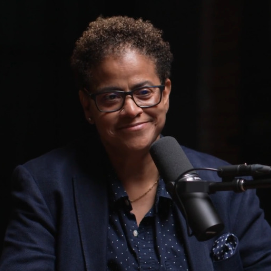In today’s episode of The Deep Cut Melissa is explaining why you should invest time in researching your bank and developing a relationship with whichever one you choose.
Transcript:
It’s time for The Deep Cut, from Founder Hustle, the podcast series by, for and about the New Majority entrepreneur.
I am your host Melissa Bradley, founder of 1863 Ventures.
As a seasoned venture capitalist,I provide practical advice and tools to entrepreneurs and their ecosystems on how to grow and scale their business.
But I also realize that you can’t be successful without knowing what has come before, as well as preparing for what is yet to come. And that’s where The Deep Cut comes in.
Considering that over 50% of small businesses fail within five years, these bonus episodes are where we level up on the history that brought us to this moment and the current events that can impact the stability and growth of your business and shape your future. The Deep Cut is a powerup from Founder Hustle to help you on the journey from founder to CEO.Music – Ratata plays and fades out for another 3 secs (audiofile; artistlist.io)
Today’s deep cut is one of the many reasons why we decided to include these bonus episodes as it gets the heart of when we say by knowing the history, you can better see the present and strategize for the future. In Episode 105 of Founder Hustle with Mballou Conde-Kouyate, we heard what it takes to have a healthy relationship with the bank from a baker who cares, and someone who wants to be your economic first responder and actually help you succeed.
But on the flip side, we heard in episode 107 with April Harris, and she shared her challenges with accessing capital from a bank. Her story is unfortunately not that unique, so based on the responses we have gotten from both episodes, I want to add some more history and clarity, because it is important to understand that not all banks are created equal.
A recently released survey from the Federal Reserve shows how the pandemic has altered the financial landscape for all small businesses. About 85% have experienced financial difficulty since covid, which is up nearly 20% percentage points from prior years. Back then, more than half of owners who sought a loan were looking to expand. However, last year, the majority of applicants needed funds just to cover every day operating expenses. Meanwhile, inflation is the highest, and decades with raw materials and finished goods soaring in price and workers demanding higher wages. The Federal Reserve is raising interest rates in response, which means the cost of borrowing money is going up. Even in normal times, that can be tough for small businesses to get loan from traditional banks because they lack the assets and credit histories of bigger companies. Post covid banks have been even stingier outside of their own covid related programs, and two years in loan applicants are more likely to get turned down or to receive less money then they ask for compared to years before. Only about 30% of businesses that apply for financing last year got the full amount they asked for, which is down for about half from the prior year. And of course, firms owned by people of color, firms with fewer employees, and leisure and hospitality firms were least likely to receive the full amount of financing sought.
About 68% of the applicants got some of the amount they applied for, which was down from prior years where the success rate ranged from 75% to 85%.
The current loan environment is clearly making it tougher on small businesses trying to recover from the pandemic. Their balance sheets, which banks look at to assess loan applications, were weakened during the pandemic, even if their future prospects are bright..post-covid, big banks approve less than 15% of their loan request, while small banks approve just over 20%. Both of those are down from prior years. The bank’s stinginess has led business owners to consider other options such as community banks, online lenders, and crowdfunding sites. Owners were more likely to apply for an online loan post-covid while applicants were less likely to seek financing from a small bank.
This is all according to research by the Federal Reserve Bank of New York. The research showed about 25% of new majority owned firms applied for PPP loans through FinTech lenders.
Why? The historical factors that have prevented new majority owners from receiving bank credit continued to operate with the PPP program. Where our denial rates were over 65%. And if and when we were funded, we were often charged anywhere between one to 3% more in interest than our white peers. There are trade-offs, however, these alternative loans can be easier to get, but likely come with higher interest rates or steep penalties. Typically traditional banks, small business ones carry interest rate from 3 to 7%, while online rates are vary widely, but can start at 10% and go even higher.
The good news is though that small businesses do have plenty of options out there, although they may not be the cheapest ones. Data shows new majority entrepreneurs are far less likely to secure business capital than their white counterparts. And when they do, that capital comes in much smaller amounts with much higher interest rates. Other racial disparities in a host of financial systems – from student loans that disproportionately bury new majority borrowers in debt at the beginning of their entrepreneur journeys, and a credit reporting system that unfairly penalize new majority consumers, to a lack of access to other forms of funding – All of these lead more new majority would be business owners to turn to high interest credit cards and other more expensive means in order to open their businesses.
In fact, according to the US Small Business Administration, more new majority firms turn to personal credit cards as a source of start-up capital than to bank loans.
One option to try to change this is to bring back character-based lending to communities of color. Banks make business lending decisions that penalize new majority of business owners and entrepreneurs based on systemically bias policies that have disadvantaged us for generations. We’ve already examined the racially disparate impact of credit scoring. Those scores negatively impact new majority business owners as well by putting the business capital needed to start, scale, and succeed out of reach of most founders.
I’m thrilled to say that many of the entrepreneurs I have worked with have received character-based loans. By the virtue of my endorsement, participation in rigorous accelerator programs, or making early connections to a banker, new majority entrepreneurs have been able to share their story, vision, traction, and allow the bankers to get to know them beyond an application and a bank balance.
A lesson moving forward: make time to build a relationship with the bank that cares about you and your business. And of course, be sure to investigate fee services and the decision making process on loans. The time spent doing that research will clearly generate a significant return on your investment when they’re able to meet your capital needs based on trust and performance and not just a credit score and a cash flow statement.
Whether personal or professional, establishing relationships is not easy. Well, we all know that successful relationships are built on trust, authenticity and honesty. And much like our personal relationships, if you cannot establish healthy communication in an honest relationship, in this case with your bank, then get out. Your financing is key to your future. As I’ve talked about entrepreneurship as a team sport, and your banker is a significant part of your team. One weak link in your team, and you will not win. Making sacrifices at the onset of who you get to support you will clearly damage your reputation and your return on investment.
On your journey from founder to CEO, you will have a variety of financing opportunities.
Yes, The History of banking has not been kind to us, but now is the time for new majority entrepreneurs to put the work into making sure that they have the team that is there for you and supporting your business.
Thank you for listening.
Thank you for listening. Don’t forget to subscribe to the Founder Hustle Podcast where you can hear thought provoking interviews along with our Deep Cuts.
Check us out at founderhustle.io.
You can find us on Twitter at @FounderHustle.
On Instagram we’re @_founderhustle.
And if you’re a Facebook person we’re also there as Founder Hustle.
Founder Hustle and the Deep Cut are produced by Kinetic Energy Entertainment.
Edited and mixed by Anne Kane.
Social media producer is Misako Envela.
Music is Ratata by Curtis Cole.
And remember, knowledge is crucial, because knowledge is power.
Referenced in Today’s Episode:
- Small businesses in need of a loan find banks are stingy (AP News, April 2022)
Credits:
- Founder Hustle and the Deep Cut are produced by Kinetic Energy Entertainment
- Edited and mixed by Ann Kane.
- Social media producer is Misako Envela
- Music is Ratata by Curtis Cole



